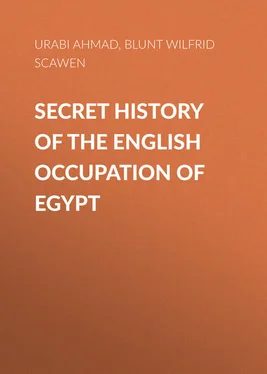Wilfrid Blunt - Secret History of the English Occupation of Egypt
Здесь есть возможность читать онлайн «Wilfrid Blunt - Secret History of the English Occupation of Egypt» — ознакомительный отрывок электронной книги совершенно бесплатно, а после прочтения отрывка купить полную версию. В некоторых случаях можно слушать аудио, скачать через торрент в формате fb2 и присутствует краткое содержание. Жанр: foreign_antique, foreign_prose, Историческая проза, на английском языке. Описание произведения, (предисловие) а так же отзывы посетителей доступны на портале библиотеки ЛибКат.
- Название:Secret History of the English Occupation of Egypt
- Автор:
- Жанр:
- Год:неизвестен
- ISBN:нет данных
- Рейтинг книги:4 / 5. Голосов: 1
-
Избранное:Добавить в избранное
- Отзывы:
-
Ваша оценка:
- 80
- 1
- 2
- 3
- 4
- 5
Secret History of the English Occupation of Egypt: краткое содержание, описание и аннотация
Предлагаем к чтению аннотацию, описание, краткое содержание или предисловие (зависит от того, что написал сам автор книги «Secret History of the English Occupation of Egypt»). Если вы не нашли необходимую информацию о книге — напишите в комментариях, мы постараемся отыскать её.
Secret History of the English Occupation of Egypt — читать онлайн ознакомительный отрывок
Ниже представлен текст книги, разбитый по страницам. Система сохранения места последней прочитанной страницы, позволяет с удобством читать онлайн бесплатно книгу «Secret History of the English Occupation of Egypt», без необходимости каждый раз заново искать на чём Вы остановились. Поставьте закладку, и сможете в любой момент перейти на страницу, на которой закончили чтение.
Интервал:
Закладка:
It was not long, however, before Ismaïl fell into much more dangerous hands, and embarked in much more ruinous adventures than these early ones. To say nothing of the enormous sums which he poured out like water on his own private pleasures, of his follies of palace building, his follies with European women, and his follies of royal entertainment, there were schemes of ambition vast enough to drain the purse of any treasury. It is not known precisely how many millions he expended at Constantinople in procuring himself the Khedivial title, and in getting the order of the viceregal succession altered in favour of his son. But it must have been very many, while still more went in hair-brained schemes of speculation and in liabilities contracted towards European syndicates. Lastly, there was the conquest of the Upper Nile, and the attempted conquest of the kingdom of Abyssinia. To provide for all these immense expenditures loans had to be raised, at first on a small scale with local bankers and Greeks of Alexandria, and presently in more reckless fashion on the European Stock Exchange. Here his worst counsellor and evil genius had been Nubar Pasha, the Armenian financier, who, by a strange inversion of ideas, has come to be regarded by a certain class of Egyptian opinion ignorant of history as an "Egyptian patriot." Nubar was, however, in fact, the one man who, more than any other after Ismaïl himself, was responsible for Egypt's financial ruin. 2 2 Note in correction as to Nubar's wealth see Appendix Конец ознакомительного фрагмента. Текст предоставлен ООО «ЛитРес». Прочитайте эту книгу целиком, купив полную легальную версию на ЛитРес. Безопасно оплатить книгу можно банковской картой Visa, MasterCard, Maestro, со счета мобильного телефона, с платежного терминала, в салоне МТС или Связной, через PayPal, WebMoney, Яндекс.Деньги, QIWI Кошелек, бонусными картами или другим удобным Вам способом. .
Commissioned by his master to find him money at any cost to meet his extravagant wants, he raised loan after loan for him in Europe on terms which realized for him hardly more than 60 per cent. of the capital sums he inscribed himself for as debtor, while he, Nubar, pocketed as commission several millions sterling. Of the ninety-six millions nominally raised in this way, it has been calculated that only some fifty-four reached Ismaïl's hands.
At the date which I am writing of the whole of this liability had not yet been incurred, but already the interest on the foreign debt amounted to four millions yearly, and to raise sufficient revenue to meet it and to carry on the administration and pay the huge expense of the Abyssinian war, the peasantry were being fleeced, as I have described, under pressure of the whip, of their last hoarded piastres. Those who talk lightly in these days of Ismaïl as a prince rather unfortunate than guilty, and to be pitied in some sort for the betrayal of the country financially to Europe, know nothing of the truth, nor do they realize the enormity of the ruin inflicted by his selfish folly on his fellah subjects. It has been calculated that the total cost of his reign to Egypt amounted to something like 400 millions sterling, nor is this in my opinion an exaggerated estimate, for it had gathered in the whole of the peasant savings of a number of prosperous years, and nearly the whole of their agricultural stock besides the public debt, and left them, moreover, indebted privately to the amount of something like twenty millions to the Greek and other local usurers.
Such had been the causes of Egypt's misfortunes as I learned them at Cairo in the spring of 1876. With regard to the origin of our financial intervention, it was certainly at that time Ismaïl's own foolish doing, and was not, as far as I know, prompted by any direct political motives in England. He most certainly applied to the English Government for financial assistance through Colonel Staunton in the autumn of 1875, and in a way that almost necessitated the assistance having a political character. His reason for choosing England rather than France as the recipient of his confidences was that at the time England was in a far better position financially to help him. The French Government was still crippled by the expense of the war with Germany of 1870, and was really unable to assist him in any effectual way, while, as I have already said, the friendship long existing between England and Turkey, and the abstention of Englishmen so far from commercial intrigues in Egypt had probably convinced him, in company with the general opinion of the Mohammedan East, that England was a non-aggressive power as far as the Ottoman Empire was concerned. Especially in the matter of the Suez Canal the French Government had become an object of suspicion, and it was therefore natural that when Ismaïl resolved to sell his shares in the Canal, it was to England rather than to France that he made the offer of them. I remember well the impression produced in England at the time. It was by no means one of general approval, and Disraeli was much blamed for involving the Government in a transaction which had almost necessarily political consequences. What is, I think, not generally known, at any rate in Egypt, is that the agreement to purchase the Khedive's share for four millions sterling was made not by the English Government collectively, for Lord Derby was averse to it, but on the personal responsibility of the Prime Minister who, without consulting his colleagues other than Lord Derby, they being absent from London, arranged with the London house of Rothschild to advance the money. What may have been in Disraeli's mind politically about it I do not know, but I am very sure that Lord Derby, who was then at the Foreign Office, had no idea connected with it of political aggression. Lord Derby was a man whose view of foreign policy was essentially one of non-intervention, nor had Disraeli as yet succeeded in indoctrinating his party with his own imperialistic ideas. The transaction, nevertheless, was one of evil augury for Egypt, and especially by reason of the part played in it by the Rothschilds. As will be seen later, the financial connection of this too powerful Hebrew house with Egypt was the determining cause, six years later, of England's military intervention. 3 3 Since this was written much new information with regard to the purchase of the Canal shares has been made public, modifying in some degree the account here given; the main facts however regarding the Rothschilds' connection with it and Disraeli's remain untouched.
Mr. Cave's mission, which followed immediately on the purchase of the Canal shares, was without any question Ismaïl's doing also. The object in Ismaïl's mind, as is perfectly clear, when he asked for it, was still further to work the new mine of English political assistance he had discovered, with a view to further loans. He wanted to get some public testimonial, in the shape of a published report, in favour of his continued solvency, and so to re-open to him the European stock exchanges. It was for this purpose that he applied to Colonel Staunton for an English inquiry, and to a large extent he succeeded in his plan. Mr. Cave, who was chosen by the English Government for the inquiry, was a worthy and, I believe, quite disinterested man, but one who lacked experience of the East, and so was specially easy to deceive; he lacked also the fibre necessary for dealing quite courageously with all the facts. Ismaïl, like most spendthrifts, when it came to the point of showing his accounts, had always concealed a part of them, and, with the assistance of Ismaïl Sadyk, now gave a fanciful budget of his revenue, which Cave too readily accepted. He also allowed dust to be thrown in his eyes to some extent as to the misery of the fellahin. It was the Khedive's plan to surround distinguished financial visitors whom he desired to captivate with the show of great wealth. The mission was splendidly entertained and taken about everywhere by the Khedive's officers, who arranged things beforehand, and prevented as far as possible the nakedness of the land from being seen. Thus Cave's report, when it was published, gave only a partial truth. I think too that Cave might have insisted, if he had been of a stronger character, on the fact which lay at the bottom of all Egypt's financial difficulty, namely, that in justice, and indeed it might have been maintained in law, Ismaïl's debts were personal not public ones, and should have been so treated. Cave's weakness on this point was the beginning of the political intervention in favour of the bondholders, and his report led by a necessary logic to the recognition of Ismaïl's debt as a public obligation. Sir Rivers Wilson, who immediately followed him, though a far abler man, was equally inexperienced, and was at that time chosen, I believe, principally for his knowledge of the French language. I knew him intimately, and I knew also, but in a less degree, Cave; and I continued in correspondence with Wilson for some years and am well acquainted with all his Egyptian doings.
Читать дальшеИнтервал:
Закладка:
Похожие книги на «Secret History of the English Occupation of Egypt»
Представляем Вашему вниманию похожие книги на «Secret History of the English Occupation of Egypt» списком для выбора. Мы отобрали схожую по названию и смыслу литературу в надежде предоставить читателям больше вариантов отыскать новые, интересные, ещё непрочитанные произведения.
Обсуждение, отзывы о книге «Secret History of the English Occupation of Egypt» и просто собственные мнения читателей. Оставьте ваши комментарии, напишите, что Вы думаете о произведении, его смысле или главных героях. Укажите что конкретно понравилось, а что нет, и почему Вы так считаете.












